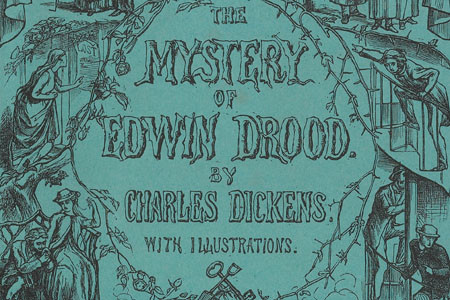The Mystery of Edwin Drood was the last (and unfinished) novel by one of Britain’s best-loved authors, Charles Dickens. The novel was in the process of being issued in installments, when, after a full day’s work on Drood, Dickens died suddenly of a stroke in June 1870 at his home at Gad’s Hill.
Chapman & Hall, Dickens’s publisher, saw a problem. Or perhaps an opportunity. Only six numbers had been made ready for publication. Knowing that the September 1870 installment would be the last – and that the mystery of Edwin Drood would remain unsolved – Chapman & Hall raised the price of the final installment by six pence. The material evidence of the last-minute price hike, shown in the cover detail of the installment of September 1870, makes an interesting suggestion to scholars of the material text about what might have been concerning to the publisher, which now had Dickens’s death, an unfinished serial, and an unsolved mystery on its hands.

Dickens revolutionized the concept of publishing books in parts, starting with The Pickwick Papers, in 1836-37. Not easy for the author, each installment had to present instantly recognizable characters, move the plot forward and pick up the threads of multiple story lines, all while building suspense. But the practice was a boon for readers, who, at one shilling per installment, could more easily afford to buy the book in parts. Publishers benefitted, too, from the advertising space that they could sell in the front and back of each installment.
Demonstrating his virtuosity (or perhaps his determination), Dickens did not follow the writerly rule of his contemporary, Anthony Trollope, who vowed that he would not publish the first word of a book in parts until he had written the last.
The Beinecke Library holds a wonderful collection of Dickens materials, including original artwork by Phiz and Sam Luke Fildes and others, for the early illustrated editions. The collection was given to Yale by Richard Gimbel and is described completely in Dickens and Dickensiana: A Catalogue of the Richard Gimbel Collection in the Yale University Library, by John Podeschi (Yale Univ. 1980).
